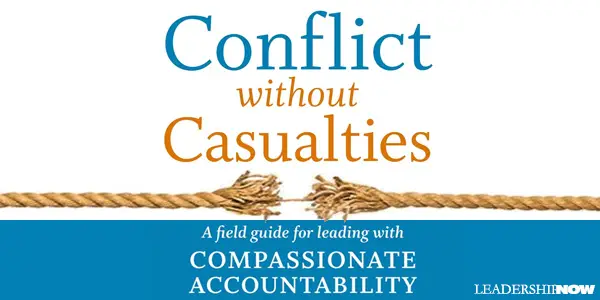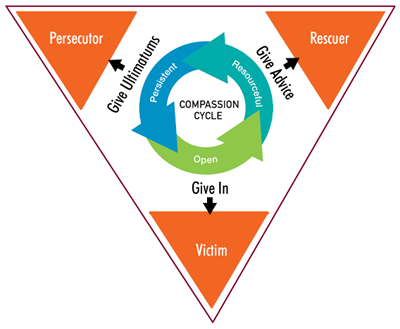 |
 |
04.14.17

Conflict without Casualties
C Conflict is energy, and can be used in positive or negative ways. Negative conflict becomes drama, and it is costly to companies, teams and relationships at all levels. In fact, according to a Gallup Poll, negative conflict drains the U.S. economy by about $350 billion a year in lost productivity and wasted energy. In Conflict without Casualties, author Nate Regier believes that the misuse of conflict energy is the biggest crisis facing our world, and that we haven’t even begun to harness the creative potential of conflict. When people embrace the fullest meaning of compassion as a process of “struggling with” others in creative conflict, they can transform lives, companies, and the world. It is understandable that we try to avoid conflict considering all of the drama and negative fallout that always seems to accompany it. But Regier says if we use conflict correctly, we can use it to create. “Eliminating the casualties of conflict cannot happen by repressing the conflict and just ‘being nice.’ It happens by stewarding the energy inherent in conflict to make something positive, even amazing.” That seems like a tall order, but it makes sense. Compassionate Accountability The way forward is to practice Compassionate Accountability. Compassionate Accountability is a method for resisting the negative pull of drama—“I gotta win.” Negative conflict becomes drama. “Drama is the mismanaging of the energy of conflict. It diverts energy towards the pursuit of self-justification, one of the strongest human urges and the one that almost always gets us into trouble.” (Chapter 2 on drama is one of the clearest discussions of drama I’ve read.) To be compassionate is to struggle alongside with others; to struggle with instead of against. “Compassion is the result of people taking ownership of their feelings, thoughts and behaviors, and choosing to spend the energy of conflict pursuing effective solutions that preserve the dignity of all involved. Compassion is more than care and concern for others. It’s about the willingness to get in the trenches and struggle together as an equal with others.”
Openness
Resourcefulness
Persistence
These three skills are a process that starts at Open, moves to Resourceful, and finally to Persistence. They are three interdependent ways of feeling, thinking, and acting that work productively together. When Regier’s model is placed inside the Drama Triangle (developed by Steven Karpman), the author creates a useful visual for understanding where we often end up if we don’t intentionally stay the Compassionate Accountability course. Regier writes: “Drama inevitably pushes us into corners, where we cling to distorted worldviews that compel us to do the same thing over and over, expecting different results. Compassion, on the other hand, keeps us moving, searching, nimble, effective, and capable of adapting to change.” It also keep us from being mired inside our own head and thus limiting our responses and our ability to reframe the conflict. We get stuck.  It would seem that if you stop at Persistence then you become stagnant and eventually irrelevant. A state of non-judgmental receptivity would seem to go hand-in-hand with progress, the inevitability of change, and the understanding of others. “As a species, human beings seem to have a very difficult time returning to Openness in order to keep the cycle going. We take up residence at Persistence, which inevitably morphs into Persecutor as we fight to protect what we’ve built and save ourselves from the consequences of our own creation.” He adds, “Each point on the Compassion Cycle has a purpose. When that purpose is fulfilled, it’s time to move. Lingering after the purpose has been achieved is a recipe for stagnation and drama.” If you want to end the drama in your life or organization then you have to replace it with something else. Compassionate Accountability is the cure. Regier concludes the book with a section devoted to implementing this concept into everything you do. A very useful user’s manual. 
Posted by Michael McKinney at 06:01 PM
|
BUILD YOUR KNOWLEDGE
 

How to Do Your Start-Up Right STRAIGHT TALK FOR START-UPS 
Grow Your Leadership Skills NEW AND UPCOMING LEADERSHIP BOOKS 
Leadership Minute BITE-SIZE CONCEPTS YOU CAN CHEW ON 
Classic Leadership Books BOOKS TO READ BEFORE YOU LEAD |